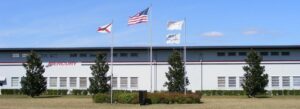
Mercury Marine earns zero-waste designation

Mercury Marine has gained a zero-waste-to-landfill designation for its Plant 7 manufacturing operation in St. Cloud, Florida.
The factory makes electrical and plastic components for the company’s marine engines and related parts, accessories and technologies.
Plant 7 is the fourth Mercury facility to achieve this designation. Its three predecessors are all distribution centres: one at the Mercury world headquarters in Fond du Lac, Wisconsin; another in Old Lyme, Connecticut, as part of the Land ‘N’ Sea subsidiary’s operations; and another at the Mercury European headquarters in Petit-Rechain, Belgium.
The St. Cloud operation is the company’s first manufacturing plant to earn the zero-waste-to-landfill label. The company says it is also its first facility to employ waste-to-energy methodology to help achieve this sustainability benchmark.
“As part of our sustainability goals, Mercury is taking decisive measures to reduce our climate impact, including reducing our dependence on landfill disposition of our waste across the enterprise,” says Scott Louks, Mercury sustainability manager.
“In all cases, this was no simple accomplishment. The distribution centres extensively deal with packing materials and containers that — without focused efforts to reduce, reuse and recycle — could generate considerable landfill waste. And avoiding the use of landfills when manufacturing electrical and plastic components likewise requires careful analysis and creative waste-stream solutions to minimise the impact on the environment.”
For ongoing compliance with the required standards, Mercury says it has developed sound methodology for ongoing monitoring at each zero-waste-to-landfill location. The teams regularly measure their respective plants’ waste-stream materials generated from operations, and the amount of those materials moved into the proper processes of reuse and recycling.
“Plant 7 recently launched a program to divert 250 tonnes annually of manufacturing waste — including paper, wood, plastics, cardboard and packaging materials — away from landfills to a company that manufactures a product it calls Enviro-Fuelcubes,” reveals Bob Rock, materials manager at the St. Cloud facility.
“Designated by the EPA as non-waste fuel, the cubes are an engineered alternative fuel designed to be a cost-effective and cleaner pound-for-pound replacement for coal and other traditional fossil fuels. Plant 7 waste materials will now go toward creating clean fuel for energy-intensive industrial processes such as the manufacture of cement and lime, as well as creating power for public consumption.
“After working for many years to put a lasting recycling program in place for waste generated by our injection-moulding process, we have finally accomplished an even better solution. I’m proud to have led a team effort to develop a process that avoids contributions to air, soil and water pollutants resulting from landfill disposals,” he adds.
Earlier this year, Mercury announced its Avator electric outboard concept, which it says advances its commitment to sustainability by offering the prospect of boating with zero direct emissions.
